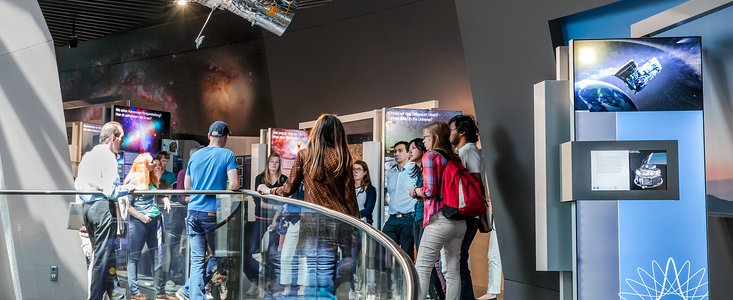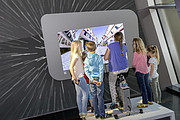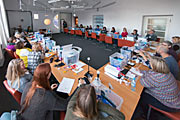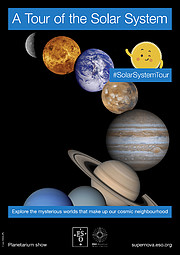Mededeling
ESO Supernova Offers Unforgettable Learning Experiences
Extensive educational programme available at the new ESO Supernova Planetarium & Visitor Centre
11 mei 2018
The cutting-edge ESO Supernova Planetarium & Visitor Centre provides unforgettable learning experiences for students of all ages. Engaging workshops, tours and two new educational planetarium shows all capture the night sky’s incredible ability to inspire a love for science in young people. All educational activities are available free of charge.
Open to the public since 28 April 2018, the ESO Supernova Planetarium & Visitor Centre offers a wide range of captivating shows, workshops and events. The ESO Supernova educational programme has been designed to be adaptable to students aged 4–18, and includes a range of interactive workshops and tours, as well as access to our cutting-edge astronomy exhibition. Furthermore, two presenter-led planetarium shows — The Skies Above Us and A Tour of the Solar System — have recently joined the exciting educational program on offer at the ESO Supernova.
The Skies Above Us is an interactive planetarium show that has been specifically developed for kindergarten and early primary school groups aged 4–7. This live show helps young learners to understand the Earth’s day-night cycle, to develop a sense of time and space, and to appreciate Earth’s place in the Solar System. It captures the inspiring nature of the night sky, tells the stories of the constellations, and investigates the relationship between the Earth, the Moon and the Sun from the vantage point of space, offering young audiences a first insight into the Earth–Moon–Sun system.
A Tour of the Solar System is a magical show that combines an exploration of the night sky above us with an interactive journey through the Solar System. This show has been designed for primary school pupils aged 8–11 and gives the audience an idea of the location of their home relative to the rest of the Earth, and the position of the Earth relative to the rest of the Solar System. It first explains why the ESO telescopes are situated in the barren Chilean desert, before investigating the patterns, stories and legends of the constellations and taking viewers from the Earth to explore the rest of the Solar System. The audience discovers what makes each planet so unique, and how each one compares to the Earth.
As well as these captivating planetarium shows, we have created six different hands-on workshops tailored to students of varying ages. Each workshop is linked to the school curriculum and gives students a fun and interactive experience of life as an astronomer. Also on offer are engaging and personal tours led by ESO scientists and engineers, which are full of information about astronomy and the important role that ESO plays in this fascinating area of science. Interaction with active ESO scientists gives pupils the opportunity to ask questions and develop an understanding of scientific career paths.
Pupils can also explore our fascinating 2200 m2 exhibition, which investigates many fundamental astronomical concepts and covers a wide range of curriculum content. Learners can explore, touch, and use real astronomical artefacts, and conduct experiments to get an idea of what it means to be an astronomer discovering the mysteries of the Universe.
The ESO Supernova Planetarium & Visitor Centre is committed to making astronomy accessible to all. Our educational materials will be available for free online, and there will be several teacher training sessionsper year at the ESO Supernova in collaboration with partners such as the Haus der Astronomie. These sessions cover a variety of topics and will connect teachers with active scientists and engineers.
You can browse the full range of educational content here, and subscribe to our education newsletter here. The first showings of A Tour of the Solar System and The Skies Above Us took place on Wednesday 2 May, and the shows are now screened regularly. Book your seats and get more information on these exciting shows here. Tickets should be reserved in advanced and can be printed inside the ESO Supernova.
More Information
The ESO Supernova Planetarium & Visitor Centre
The ESO Supernova Planetarium & Visitor Centre is a cutting-edge astronomy centre for the public and an educational facility, located at the site of the ESO Headquarters in Garching bei München. The centre hosts the largest tilted planetarium in Germany, Austria and Switzerland and an interactive exhibition, sharing the fascinating world of astronomy and ESO to inspire coming generations to appreciate and understand the Universe around us. All content is provided in English and German and entrance is free, but requires prior booking. For more details visit: supernova.eso.org
The ESO Supernova Planetarium & Visitor Centre is a cooperation between the European Southern Observatory (ESO) and the Heidelberg Institute for Theoretical Studies (HITS). The building is a donation from the Klaus Tschira Stiftung (KTS), a German foundation, and ESO runs the facility.
ESO Supernova is proudly supported by: Evans & Sutherland and Energie-Wende-Garching.
KTS
The Klaus Tschira Stiftung (KTS) was created in 1995 by the physicist and SAP co-founder Klaus Tschira (1940-2015). It is one of Europe’s largest privately funded non-profit foundations. The Foundation promotes the advancement of the natural sciences, mathematics, and computer science, and strives to raise appreciation for these fields. The Foundation’s commitment begins in kindergarten and continue in schools, universities, and research facilities. The Foundation champions new methods of scientific knowledge transfer, and supports both development and intelligible presentation of research findings.
HITS
The Heidelberg Institute for Theoretical Studies (HITS gGmbH) was established in 2010 by the physicist and SAP co-founder Klaus Tschira (1940-2015) and the Klaus Tschira Foundation as a private, non-profit research institute. HITS conducts basic research in the natural sciences, mathematics, and computer science, with a focus on the processing, structuring, and analyzing large amounts of data. The research fields range from molecular biology to astrophysics. The shareholders of HITS are the HITS Stiftung, which is a subsidiary of the Klaus Tschira Foundation, Heidelberg University and the Karlsruhe Institute of Technology (KIT). HITS also cooperates with other universities and research institutes and with industrial partners. The base funding of HITS is provided by the HITS Stiftung with funds received from the Klaus Tschira Foundation. The primary external funding agencies are the Federal Ministry of Education and Research (BMBF), the German Research Foundation (DFG), and the European Union.
ESO
ESO is the foremost intergovernmental astronomy organisation in Europe and the world’s most productive ground-based astronomical observatory by far. It has 15 Member States: Austria, Belgium, Czechia, Denmark, France, Finland, Germany, Italy, the Netherlands, Poland, Portugal, Spain, Sweden, Switzerland and the United Kingdom, along with the host state of Chile and with Australia as a strategic partner. ESO carries out an ambitious programme focused on the design, construction and operation of powerful ground-based observing facilities enabling astronomers to make important scientific discoveries. ESO also plays a leading role in promoting and organising cooperation in astronomical research. ESO operates three unique world-class observing sites in Chile: La Silla, Paranal and Chajnantor. At Paranal, ESO operates the Very Large Telescope, the world’s most advanced visible-light astronomical observatory and two survey telescopes. VISTA works in the infrared and is the world’s largest survey telescope and the VLT Survey Telescope is the largest telescope designed to exclusively survey the skies in visible light. ESO is a major partner in ALMA, the largest astronomical project in existence. And on Cerro Armazones, close to Paranal, ESO is building the 39-metre European Extremely Large Telescope, the E-ELT, which will become “the world’s biggest eye on the sky”.
Links
- The ESO Supernova education programme
- The Skies Above Us
- A Tour of the Solar System
- The ESO Supernova programme
- The ESO Supernova range of planetarium shows
- The ESO Supernova website
- ESO Supernova fact sheet (PDF)
- Support ESO Supernova
Contact
Tania Johnston
ESO Supernova Coordinator
Garching bei München, Germany
Tel: +49 89 320 061 30
Email: tjohnsto@eso.org
Wolfgang Vieser
ESO Education Coordinator
Garching bei München, Germany
Tel: +49 89 3200 6183
Email: education@eso.org
Over de Mededeling
| Id: | ann18032 |
Our use of Cookies
We use cookies that are essential for accessing our websites and using our services. We also use cookies to analyse, measure and improve our websites’ performance, to enable content sharing via social media and to display media content hosted on third-party platforms.
ESO Cookies Policy
The European Organisation for Astronomical Research in the Southern Hemisphere (ESO) is the pre-eminent intergovernmental science and technology organisation in astronomy. It carries out an ambitious programme focused on the design, construction and operation of powerful ground-based observing facilities for astronomy.
This Cookies Policy is intended to provide clarity by outlining the cookies used on the ESO public websites, their functions, the options you have for controlling them, and the ways you can contact us for additional details.
What are cookies?
Cookies are small pieces of data stored on your device by websites you visit. They serve various purposes, such as remembering login credentials and preferences and enhance your browsing experience.
Categories of cookies we use
Essential cookies (always active): These cookies are strictly necessary for the proper functioning of our website. Without these cookies, the website cannot operate correctly, and certain services, such as logging in or accessing secure areas, may not be available; because they are essential for the website’s operation, they cannot be disabled.
Functional Cookies: These cookies enhance your browsing experience by enabling additional features and personalization, such as remembering your preferences and settings. While not strictly necessary for the website to function, they improve usability and convenience; these cookies are only placed if you provide your consent.
Analytics cookies: These cookies collect information about how visitors interact with our website, such as which pages are visited most often and how users navigate the site. This data helps us improve website performance, optimize content, and enhance the user experience; these cookies are only placed if you provide your consent. We use the following analytics cookies.
Matomo Cookies:
This website uses Matomo (formerly Piwik), an open source software which enables the statistical analysis of website visits. Matomo uses cookies (text files) which are saved on your computer and which allow us to analyze how you use our website. The website user information generated by the cookies will only be saved on the servers of our IT Department. We use this information to analyze www.eso.org visits and to prepare reports on website activities. These data will not be disclosed to third parties.
On behalf of ESO, Matomo will use this information for the purpose of evaluating your use of the website, compiling reports on website activity and providing other services relating to website activity and internet usage.
Matomo cookies settings:
Additional Third-party cookies on ESO websites: some of our pages display content from external providers, e.g. YouTube.
Such third-party services are outside of ESO control and may, at any time, change their terms of service, use of cookies, etc.
YouTube: Some videos on the ESO website are embedded from ESO’s official YouTube channel. We have enabled YouTube’s privacy-enhanced mode, meaning that no cookies are set unless the user actively clicks on the video to play it. Additionally, in this mode, YouTube does not store any personally identifiable cookie data for embedded video playbacks. For more details, please refer to YouTube’s embedding videos information page.
Cookies can also be classified based on the following elements.
Regarding the domain, there are:
- First-party cookies, set by the website you are currently visiting. They are stored by the same domain that you are browsing and are used to enhance your experience on that site;
- Third-party cookies, set by a domain other than the one you are currently visiting.
As for their duration, cookies can be:
- Browser-session cookies, which are deleted when the user closes the browser;
- Stored cookies, which stay on the user's device for a predetermined period of time.
How to manage cookies
Cookie settings: You can modify your cookie choices for the ESO webpages at any time by clicking on the link Cookie settings at the bottom of any page.
In your browser: If you wish to delete cookies or instruct your browser to delete or block cookies by default, please visit the help pages of your browser:
Please be aware that if you delete or decline cookies, certain functionalities of our website may be not be available and your browsing experience may be affected.
You can set most browsers to prevent any cookies being placed on your device, but you may then have to manually adjust some preferences every time you visit a site/page. And some services and functionalities may not work properly at all (e.g. profile logging-in, shop check out).
Updates to the ESO Cookies Policy
The ESO Cookies Policy may be subject to future updates, which will be made available on this page.
Additional information
For any queries related to cookies, please contact: pdprATesoDOTorg.
As ESO public webpages are managed by our Department of Communication, your questions will be dealt with the support of the said Department.





